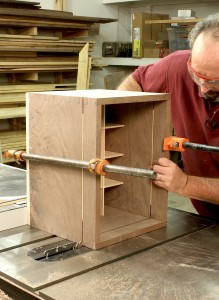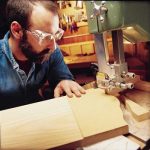We may receive a commission when you use our affiliate links. However, this does not impact our recommendations.
 These are my top six ways to elevate your woodworking game. I present them in reverse order, so if you’re looking for the top way, jump to the last entry.
These are my top six ways to elevate your woodworking game. I present them in reverse order, so if you’re looking for the top way, jump to the last entry.
.6 Don’t point out your mistakes. Most woodworkers always begin to show a piece by stating what’s wrong with his or her work. That immediately cues viewers that there are problems – that undermines your work. Professional woodworkers never point out their mistakes. They see the mistakes, learn from the mistakes and are disturbed by them, but they never make mention of them.
.5 Use the best tool for the job. Fully equipped woodworking shops have a mixture of hand and power tools. To be a better woodworker, you need to understand when to use what tool. My favorite story came about while building a Baltimore card table for the June 2005 issue (#148) (shown below at right). I needed to cut the ends of the brick-laid apron, so I rigged up a way to make the square cut at my miter saw. I spent 20 minutes getting the apron set exactly for the cut – I must say the cut was right, but I also have to say that all that set-up time was a waste.  The next time I built that table I was a better woodworker. To make that same cut, I laid out my cut line, grabbed my handsaw and sliced through the apron in seconds. What a time-savings. As a result, I’m able to produce more in the shop.
The next time I built that table I was a better woodworker. To make that same cut, I laid out my cut line, grabbed my handsaw and sliced through the apron in seconds. What a time-savings. As a result, I’m able to produce more in the shop.
.4 Have an attitude. When you believe something will work, it usually does. I used to struggle cutting restoration glass for the doors of my cabinets and cupboards. I scored the lines with a good glass cutter, but I was timid when it came time to snap the cuts. There was no telling where that line would break. One day as I watched a television show about stain-glass artists, I was amazed at how simple these folks made glass cutting look. Score. Snap. Done. The next time I cut glass I had an attitude. I scored the glass and confidently snapped the pieces. I knew it would work, and it did.
.3 Perfect practice makes perfect. Most people say practice makes perfect. If your practice is not perfect, however, then you’re apt to learn incorrect methods. Hence the addition of “perfect.” I’m always reminded of the woodworker who wanted to become excellent using a Japanese saw. He purchased an 8′-long 2×4, then set about slicing it into 1/4″-thick pieces. As he reached the end, his abilities with his saw had grown incredibly. It took only 384 slices. Practice your woodworking, but do it perfectly.
.2 Know how to fix your mistakes. My younger brother worked with my dad and me at the beginning of the business. One of the sage pieces of advice he let loose dealt with mistakes. He noted that the only difference between a woodworker and a good woodworker is that a good woodworker knows how to fix the mistakes.  Every woodworker makes them. The key is to know how to fix them, and you learn that below.
Every woodworker makes them. The key is to know how to fix them, and you learn that below.
.1 Read Popular Woodworking Magazine. This may sound self-serving, but there is more to it. The reasons are two-fold. Not only do we have in-house editors with more than 100 years of real woodworking experience (how’s that stand up to other woodworking magazines?), we have outside authors that are at the top of their game. Each issue is packed and stacked with great woodworking information. OK, here’s the real reason you should read the magazine – the entire magazine. Before I was a senior editor, I would read the articles that mattered to me. The columns and other articles were read if I had the opportunity, which seldom came along. After joining the magazine staff full-time, it was my job to read every article, sometimes two or three times each. I was amazed at what I learned as I read each article. The light bulb over my head didn’t just light-up, it shined so bright that it exploded. Today I read whatever woodworking information I can get my hands on. You have the subscription, read it. If you don’t have a subscription, click here. It will make you a better woodworker.
If you have another way to up your woodworking game, please list in in the comments.
Here are some supplies and tools we find essential in our everyday work around the shop. We may receive a commission from sales referred by our links; however, we have carefully selected these products for their usefulness and quality.








I complete agree with item #1 and #6, It is like a idiom “If at first you don’t succeed, try, try again”. If you be afraid to make mistake, you will never know how do right.
Number 6 is something I do a lot, I find that because i spend so much time up close with the project I’m working on, every mistake is magnified for me. and as amateur/weekend woodworker I make my fair share. But its the enjoyment I get turning something that’s in my mind into something for the home or workshop that keeps me interested and hopefully getting better
Thanks
James
Speaking of the Baltimore Card Table, I still think that may be the most exquisite–and most intimidating–of your magazine articles. Any chance you’re planning an instructional DVD for that project?
Don’t forget finishing. It’s the first thing most people see and can really make or break a project. (I know Glen that you will agree with this with your curly maple signature pieces). Most articles you’ll read end with an 8 line paragraph that boils down to, “Apply the stain and three coats of varnish…” Thank heaven we have Bob Flexner. Breaking out of the “find a finish that works and use it for everything” mode of most woodworkers was a big step for me. It might surprise some woodworkers that half the labor in a top end factory piece is in the finish room. Yet most woodworkers fear, loathe, and just want to get it done as quickly as possible.
I find this post to be simplistic at best and bordering on being offensive.
The topic is how to become a better woodworker. While reading is useful in that process, working at the many facets of woodworking is the basic way to get better. That means learning to sharpen tools, square stock, mark it up, cut to a line, make joints, and on and one.
While the magazine in question is certainly worthwhile, there are many other good reads out there including online forums.
And how about talking to other woodworkers? Online, in person, joining a club or taking a class. There is an excellent thread going on right now (2/12/14) in the Woodnet hand tool forum –
http://tinyurl.com/gooddiscussion
Some of the suggestions in that thread include finding a balance between hand tools and power tools and learning when something is “good enough” to allow you to move forward.
Having an “attitude” and keeping your mouth shut, may be useful in some ways, but they don’t rank anywhere near many other skills that actually make you a better woodworker. The readers of Popular Woodworking deserve more thoughtful, thorough, and valid information than this article offers.
Item 5 is important. Yes you paid good money for the power tools in your shop. But that does not mean that every operation has to be made on a power tool. Many fine pieces of furniture were produced long before the introduction of power tools. Use the tool that is best suited to the operation at hand.
It’s critical to learn to sharpen well and efficiently. It’s the gateway skill.
#2 reminded me of one of my favourite music quotes “ordinary drummers make mistakes, great drummers play them twice” ie. make it look like you meant to do it that way. In the wood world I guess that translates to either fixing your mistakes, or working around them by tweaking your design or methods to accommodate them.
Glen – Here is an addendum to #3. Don’t practice until you get it right. Practice until you never get it wrong.
Over the years as I read your articles and see your projects, I see valuable works of art. I think to myself, how could anyone do this work of high quality and say to others that they can do it to. I appreciate your articles and this article in particular. I hope that one day I too will be able to obtain as high craftsmanship as yours.
Now, build something great!